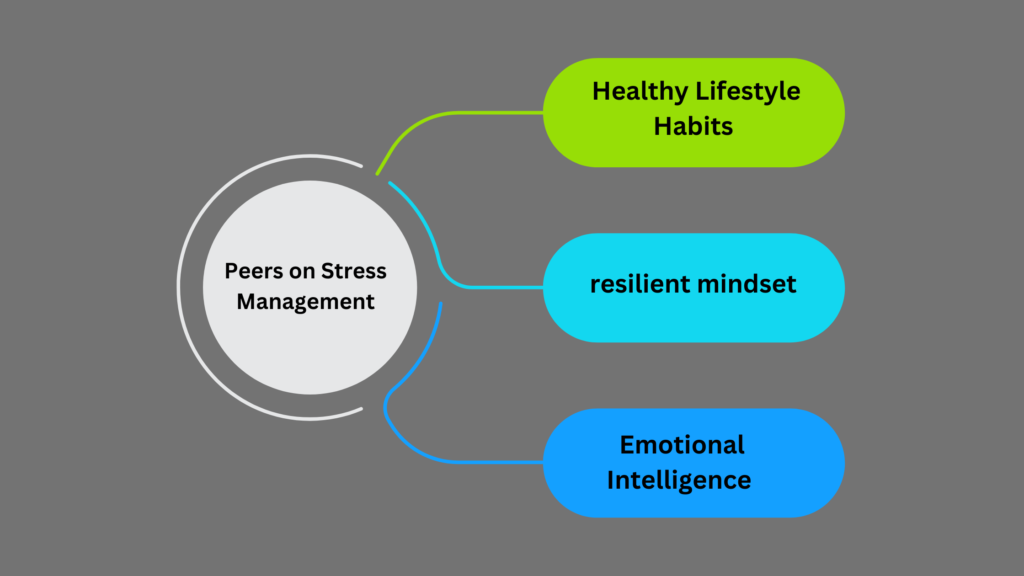
Understanding Stress’s Effects
- Develop a resilient mindset
- Practicing Time Management
- Utilizing Healthy Lifestyle Habits
- Enhance Emotional Intelligence (EQ)
- Pursue Stress-Reduction
- Establish a Solid Support System
- Foster Work-Life Balance
Introduction
Our fast-paced world causes stress for many. Everything experiences stress, but how we handle it affects our success and well-being. Some thrive under pressure, others suffer. How do they differ? They effectively manage stress. This stress-management method will exceed your peers.
Understanding Stress’s Effects
Understanding stress is vital before learning strategies. The body reacts to problems with stress, causing physical and mental responses. Chronic stress can cause burnout, anxiety, and health problems, yet short-term stress can boost performance.
You may outwit your peers by managing stress before it overwhelms you. Let’s examine proven stress management and performance-boosting methods.
1. Develop a resilient mindset
Your stress management depends on your mentality. Stress challenges resilient people, not threatens them. Adaptability and resilience distinguish individuals who flourish under duress from those who fail.
To Build Resilience:
• Reframe Negative Thoughts: Instead of “I can’t handle this,” try “This is tough, but I can find a solution.” Reframing turns powerlessness into problem-solving.
• Focus on self-compassion and avoid self-criticism. Recognize that stress is every day and not a sign of failure.
• Adopt a Growth Mindset – See setbacks as learning opportunities, not failures. This builds mental toughness and flexibility.
• Keep perspective by asking, “Will this matter in five years?” Temporary conditions magnify stress, so perspective helps.
Practicing Time Management
Poor time management causes stress for many. Task organization reduces stress and boosts productivity. Staying ahead of deadlines and avoiding last-minute stress gives time managers an edge.
Methods of Time Management
• Prioritize tasks. Use the Eisenhower Matrix to prioritize tasks by urgency/importance.
• Employ Pomodoro Technique: Focused 25-minute periods with brief breaks for productivity without fatigue.
• Avoid multitasking. It decreases efficiency and raises stress. Single-tasking improves results and reduces cognitive stress.
• Plan ahead – Create a daily to-do list to prevent last-minute rushes and maintain progress towards goals.
Utilizing Healthy Lifestyle Habits
Physical health affects stress levels. Healthy habits can help you steward stress and surpass your peers by giving you stamina and mental clarity.
Essential Lifestyle Changes:
• Regular exercise, such as yoga, jogging, or strength training, releases endorphins, which reduce stress.
• Eat a Balanced Diet: Limit coffee and sugar, prioritize whole foods, and hydrate for energy and mental clarity.
• Prioritize 7-9 hours of nonstop sleep for optimal bodily recovery and function.
• Practice Mindfulness and Meditation – Deep breathing and guided meditation can reduce stress and improve attention.
Enhance Emotional Intelligence (EQ)
Emotional intelligence (EQ) helps people understand and control their emotions. It also helps them handle stress, make sensible judgments under pressure, and maintain strong relationships.
EQ Improvement:
• Identify stress sources and create coping methods to manage them proactively.
• Manage Emotions – Practice mindfulness and breathing exercises to keep calm in stressful times.
• Enhance Interpersonal Skills – Emotional tension may be reduced via strong connections that offer Support and perspective.
• Improve Self-Awareness — Journaling or talking to a mentor helps enhance emotional control and understanding of emotional patterns.
Pursue Stress-Reduction
Several stress-management methods can be used every day. Mastering these skills can help you handle stress better than those who let it rule you.
Effective Techniques: • Progressive Muscle Relaxation (PMR) – Relieves stress and tension by tensing and releasing muscle groups.
• Box breathing exercises (inhale for 4 seconds, curb for 4, exhale for 4, tame for 4) will rapidly relax the nervous system and reduce stress levels.
• spoil in avocation such as canvas, rendition, or music for mental relaxation.
• Connect with Nature – Outdoor activities reduce stress and encourage relaxation.
Establish a Solid Support System
Strengthening social ties helps reduce stress. People with solid Support manage obstacles and maintain emotional equilibrium.
Enhancing Your Support System:
• Share feelings openly with trustworthy friends or family for perspective and emotional Support.
• Seek Professional Help – Therapists and counsellors provide customized insights and coping skills.
• Participate in social activities to build emotional resilience and a sense of belonging.
Foster Work-Life Balance
Work-life imbalance causes stress in many people. Balance is key to long-term health and career success.
Tips for Work-Life Balance: • Set Boundaries – Separate work and personal life by not reading emails after work hours.
• Regular breaks boost productivity and decrease burnout.
• Engage in non-work activities to unwind and keep your mind fresh.
Conclusion
Stress is unavoidable, but how you handle it defines success. By developing a resilient attitude, time management skills, a healthy lifestyle, and emotional intelligence, you can outperform your peers in stress management. Apply these tactics regularly, and you’ll thrive under pressure while others struggle. Mastering stress is managing it to improve productivity and well-being, not eradicating it.
